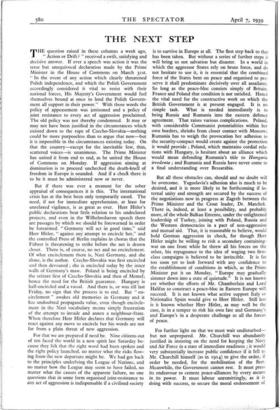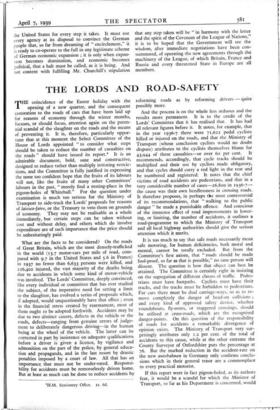THE NEXT STEP
THE question raised in these columns a week ago, " Action or Drift? " received a swift, satisfying and decisive answer. If ever a speech was action it was the terse but unequivocal declaration made by the Prime Minister in the House of Commons on March 31st. " In the event of any action which clearly threatened Polish independence, and which the Polish Government accordingly considered it vital to resist with their national forces, His Majesty's Government would feel themselves bound at once to lend the Polish Govern- ment all support in their power." With those words the policy of appeasement was jettisoned and a policy of joint resistance to every act of aggression proclaimed. The old policy was not thereby condemned. It may or may not have been justified in the circumstances which existed down to the rape of Czecho-Slovakia—nothing could be more purposeless than to argue that now—but it is impossible in the circumstances existing today. On that the country—except for the inevitable few, thin, scattered voices—is unanimous. The Prime Minister has united it from end to end, as he united the House of Commons on Monday. If aggression aiming at domination is to proceed unchecked the death-knell of freedom in Europe is sounded. And if a check there is to be it must be administered now or never.
But if there was ever a moment for the sober appraisal of consequences it is this. The international crisis has at the best been only temporarily eased. The need, if not for immediate apprehension, at least for unrelaxed vigilance, is as great as ever. Herr Hitler's public declarations bear little relation to his undeclared projects, and even in the Wilhelmshaven speech there are passages by which we should be forewarned in order be forearmed. " Germany will act in good time," said Herr Hitler, " against any attempt to encircle her," and the controlled Press of Berlin explains in chorus that the Fiihrer is threatening to strike before the net is drawn closer. There is, of course, no net and no encirclement. Of what encirclement there is, Nazi Germany, and she alone, is the author. Czecho-Slovakia was first encircled and then devoured ; she is encircled today by the inner walls of Germany's maw. Poland is being encircled by the seizure first of Czecho-Slovakia and then of Memel; hence the need for the British guarantee. Hungary is half-encircled and a vassal. And there is, or was till last Friday, no sign that the process is to end. But " en- circlement " awakes old memories in Germany and it has undoubted propaganda value, even though encircle- ment in the Nazi vocabulary means simply frustration of the attempt to invade and annex a neighbour-State. When therefore Herr Hitler declares that Germany will react against any move to encircle her his words are not far from a plain threat of new aggression.
For that we are prepared if need be. Nine citizens out of ten faced the world in a new spirit last Saturday be- cause they felt that the right word had been spoken and the right policy launched, no matter what the risks flow- ing from the new departure might be. We had got back to the principles underlying the League of Nations, and no matter how the League may seem to have failed, no matter what the causes of the apparent failure, no one questions that in some form organised joint-resistance to any act of aggression is indispensable if a civilised society is to survive in Europe at all. The first step back to that has been taken. But without a series of further steps it will bring us not salvation but disaster. In a world in which the aggressor States rely on brute force, and do not hesitate to use it, it is essential that the combined force of the States bent on peace and organised to pre- serve it shall predominate decisively over all assailants. So long as the peace-bloc consists simply of Britain. France and Poland that condition is not satisfied. Hence the vital need for the constructive work on which the British Government is at present engaged. It is no simple task. What is needed immediately is to bring Russia and Rumania into the eastern defence agreement. That raises various complications. Poland, with considerable Communist potentialities within her own borders, shrinks from closer contact with Moscow; Rumania has to weigh the provocation her adhesion to the security-compact would create against the protection it would provide ; Poland, which maintains cordial rela- tions with Hungary, is hesitant about an alliance which would mean defending Rumania's title to Hungaria irredenta ; and Rumania and Russia have never come to a final understanding over Bessarabia.
But all these obstacles can, should and no doubt will be overcome. Yugoslavia's adhesion also is much to be desired, and it is more likely to be forthcoming if in- ternal unity and strength are secured by the success of the negotiations now in progress at Zagreb between the Prime Minister and the Croat leader, Dr. Matchek. There is, indeed, at least a possibility, and probably more, of the whole Balkan Entente, under the enlightened leadership of Turkey, joining with Poland, Russia and the Western democracies in a pact of non-aggression and mutual aid. That, it is reasonable to believe, would hold German aggression in check, for though Herr Hitler might be willing to risk a secondary containing- war on one front while he threw all his forces on the other, his repugnance to the idea of waging two first- class campaigns is believed to be invincible. It is far too soon yet to look forward with any confidence to the establishment of conditions in which, as the Prime Minister put it on Monday, " Europe may gradually simmer down into a state of quietude." It is not known yet whether the efforts of Mr. Chamberlain and Lord Halifax to construct a peace-bloc in Eastern Europe will succeed. It is not known what active support Italy or Nationalist Spain would give to Herr Hitler. Still less is it known whether Herr Hitler, as may well be the case, is in a temper to risk his own fate and Germany's and Europe's in a desperate challenge to all the forces of peace.
For further light on that we must wait undisturbed— but not unprepared. Mr. Churchill was abundantly justified in insisting on the need for keeping the Navy and Air Force in a state of immediate readiness ; it would very substantially increase public confidence if it fell to Mr. Churchill himself (as in 1914) to give the order, if order be needed, for the mobilisation of the fleet. Meanwhile, the Government cannot rest. It must press its endeavour to cement peace-alliances by every means in its power. It must labour unremittingly, as it is doing with success, to secure the moral endorsement of the United States for every step it takes. It must use every agency at its disposal to convince the German people that, so far from dreaming of " encirclement," it is ready to co-operate to the full in any legitimate scheme of German economic expansion ; it is only when expan- sion becomes domination, and economic becomes political, that a halt must be called, as it is being. And not content with fulfilling Mr. Churchill's stipulation that any step taken will be " in harmony with the letter and the spirit of the Covenant of the League of Nations," it is to be hoped that the Government will see the wisdom, after immediate negotiations have been con- summated, of operating the new agreements through the machinery of the League, of which Britain, France and Russia and every threatened State in Europe are all members.











































 Previous page
Previous page